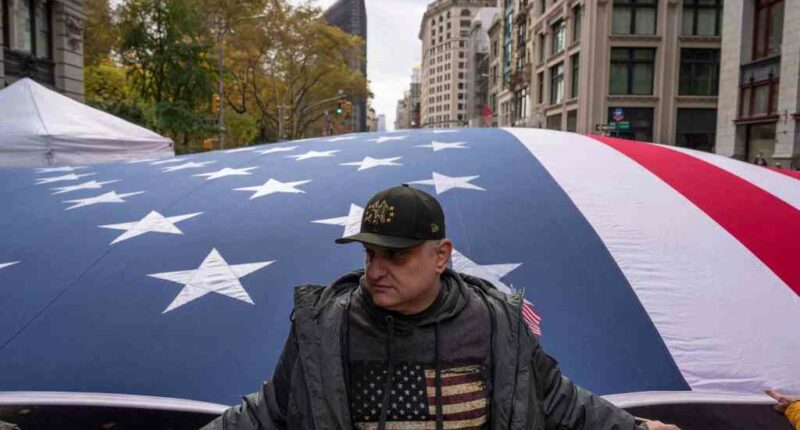Share this @internewscast.com

Recent data from U.S. government sources and financial studies reveal that nearly 60% of Americans are either living below the federal poverty line or are financially stretched from paycheck to paycheck, leaving them with little room to handle unexpected costs.
Many people resort to emergency-level spending plans to manage their finances. However, even the strictest cost-cutting measures often fall short, as essential expenses like mortgages and rent need to be prioritized. One of the first areas to face cuts is often food, leading to reduced meals or compromised nutrition. Unfortunately, numerous veterans and their families encounter this difficult decision regularly.
According to the latest figures from the U.S. Department of Agriculture, approximately 7.5% of veterans, or about 1.5 million individuals, experience hunger or food insecurity. The Department of Veterans Affairs (VA) highlights that those aged 65–74 are currently at the greatest risk, a notable shift from recent years when the 55 to 64 age group had the highest rates.
The situation is even more dire within specific subgroups. Nearly 20% of female veterans, many of whom are raising children, report experiencing food insecurity. Additionally, over one-third of disabled working-age veterans find it challenging to provide enough food for themselves.
Transitioning from military service to civilian life presents significant hurdles for many veterans, with financial difficulties and underemployment among the top issues. Securing stable, well-paying employment is a struggle, often resulting in low incomes or unemployment. For veterans dealing with disabilities or health challenges, maintaining consistent work is even more challenging, further diminishing their income potential and financial security, and increasing their risk of food insecurity.
These economic hardships are exacerbated by gaps in benefits and bureaucratic obstacles. VA disability benefits are frequently considered unearned income during means testing for certain federal programs. However, these benefits were never intended to replace a regular paycheck.
VA benefits were designed to offset the extra costs of living with a disability. In programs where they are counted toward income limits, this classification can unfairly block many veterans from receiving assistance through programs like the Supplemental Nutrition Assistance Program, or SNAP.
SNAP can provide essential short-term relief, adding protein, vegetables, and fruit to meals. Yet because disability benefits often push veterans over the income threshold too many are excluded. According to RAND, only about 4.9% of food-insecure veterans in the U.S. received SNAP assistance in 2023.
Housing instability adds another layer to the crisis — veterans who are homeless or lack stable housing face even greater challenges in maintaining consistent nutrition and accessing healthy food options.
Mental and physical health conditions, such as PTSD, depression, and chronic pain can make it difficult for veterans to access, prepare, or prioritize nutritious meals, especially when combined with financial or housing struggles. Geographic barriers further compound these difficulties for veterans living in rural areas, where grocery stores, food banks, and VA facilities may be few and far between.
On Thanksgiving, we gather around tables overflowing with turkey, vegetables, and homemade desserts, raising our glasses to those who secured our freedoms. But gratitude alone doesn’t fill an empty stomach. Veterans can’t eat our thanks.
Rather than simply thanking veterans for their service, we can honor them through meaningful action.
Volunteer. Give your time through trusted organizations like DAV (Disabled American Veterans) and its Volunteer for Veterans program. There are countless ways to make a difference — from helping at local veteran food pantries and nutrition centers, volunteering at VA medical centers, or simply delivering groceries to a veteran in your neighborhood. Even an hour a month can have a lasting impact.
Advocate. Raise your voice for those who served. Urge elected officials to honor their responsibility to veterans and their families through initiatives like DAV’s Commander’s Action Network, which helps advance legislation ensuring no veteran faces hunger or neglect.
Hire. Veterans with service-connected disabilities are among the most capable and resilient members of society. Hiring a veteran doesn’t just fill a position — it provides economic stability that helps them avoid food insecurity while strengthening an organization with proven leadership, discipline, and determination.
These tangible acts of compassion can help ensure no veteran who defended our freedom is left to face hunger alone. Together, these frontline actions create lasting change and reaffirm the nation’s promise to care for those who have borne the battle. Veterans stood up for us; now it’s our turn to stand up for them.
Through awareness, advocacy, and community support, we can work toward a future where all veterans live safe, healthy lives — free from hunger. Now that’s something to give thanks for.
Nee, a Marine veteran, is the Disabled American Veterans national commander. He previously held positions as Massachusetts secretary of veterans’ services and on DAV’s national executive committee.
















